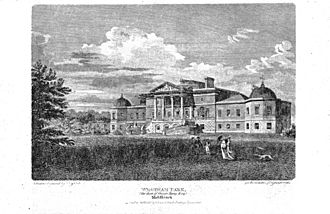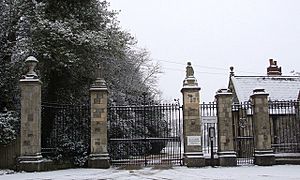Wrotham Park facts for kids
Quick facts for kids Wrotham Park |
|
|---|---|

Wrotham Park in 1820
|
|
| General information | |
| Type | English country house |
| Architectural style | Neo-Palladian |
| Location | Near Potters Bar, Hertfordshire |
| Country | England |
| Coordinates | 51°40′38″N 0°11′48″W / 51.67722°N 0.19667°W |
| Completed | 1754 |
| Destroyed | 1883 (fire), then rebuilt |
| Client | Admiral John Byng |
| Owner | Robert Byng |
| Grounds | 2,500 acres |
| Design and construction | |
| Architect | Isaac Ware |
| Other information | |
| Number of rooms | 18 bedrooms |
Wrotham Park (say it "ROO-təm") is a grand country house in Hertfordshire, England. It's built in a style called Neo-Palladian, which means it looks like old Roman buildings. The house is located near Potters Bar, about 27 kilometers (17 miles) from central London.
The famous architect Isaac Ware designed Wrotham Park in 1754. It was built for Admiral John Byng. The house and its huge 2,500-acre estate are still owned by the Byng family today. Wrotham Park is one of the biggest private homes close to London. Its unique look has made it a popular spot for filming, appearing in over 60 movies and TV shows!
The house itself is a "Grade II*" listed building. This means it's a very important historic building. Its beautiful gardens and park are also listed as "Grade II" on the Register of Historic Parks and Gardens.
Contents
History of Wrotham Park
The land where Wrotham Park stands was first known as Pinchbank way back in 1310. Later, in the 1600s and early 1700s, it belonged to the Howkins family. Then, a man named Thomas Reynolds, who worked for the South Sea Company, bought the property. He changed its name to Strangeways.
His son, Francis, later sold the estate to Admiral John Byng. Admiral Byng then had the house rebuilt by Isaac Ware in 1754.
Why the Name Wrotham Park?
Admiral John Byng decided to rename the house Wrotham Park. He did this to honor his family's original home in Wrotham, Kent. Sadly, Admiral Byng never got to enjoy his new home in retirement. He was a naval officer who led an expedition to help Menorca during the Seven Years' War. His mission was not successful.
Because of this, he faced a serious punishment in 1757. This event was even mentioned in a famous book called Candide by Voltaire. In the book, a character sees an officer being put to death and is told that "in this country, it is wise to kill an admiral from time to time to encourage the others." This quote became very famous.
Fire and Rebuilding
In 1847, the house was inherited by John Byng, 1st Earl of Strafford. When he passed away in 1860, his son, George Byng, 2nd Earl of Strafford, took over.
In 1883, a terrible fire broke out at Wrotham Park. Luckily, the fire burned slowly enough that people were able to save many of the valuable items inside the house. However, the house itself was badly damaged. It was then rebuilt exactly as it was before the fire. Wrotham Park is still owned by the Byng family today.
Wrotham Park as a Filming Location
Wrotham Park has been a popular spot for movies and TV shows for many years. Its grand look makes it perfect for historical dramas and fancy settings.
Some of the well-known productions filmed here include:
- White Mischief (1987)
- Inspector Morse (1989)
- Jeeves and Wooster (1990–1993)
- King Ralph (1991)
- Bridget Jones's Diary (2001)
- Gosford Park (2001)
- Vanity Fair (2004 film)
- Sense and Sensibility (2008)
- Jane Eyre (2011 film)
- The Hour (2011)
- Great Expectations (2012 film)
- The Kingsman movies (The Secret Service, The Golden Circle, and The King's Man)
- Mr Selfridge (2014)
- Agatha Christie's Poirot (episodes "The Adventure of Johnnie Waverly" and Third Girl)
- The Gentleman (2019)
- Downton Abbey
- The Crown
- Bridgerton (2022)
- The Diplomat (2023)
Social Events at Wrotham Park
Wrotham Park is also a popular place for big events and celebrations.
- In 1995, Pavlos, Crown Prince of Greece and Marie-Chantal Miller held a pre-wedding party here. About 1,300 guests attended before their wedding on July 1st.
- In 2006, famous footballer Ashley Cole and singer Cheryl had a blessing ceremony for their wedding at Wrotham Park. They couldn't have the actual wedding there because the house didn't have the right license for civil weddings.
 | Jewel Prestage |
 | Ella Baker |
 | Fannie Lou Hamer |


